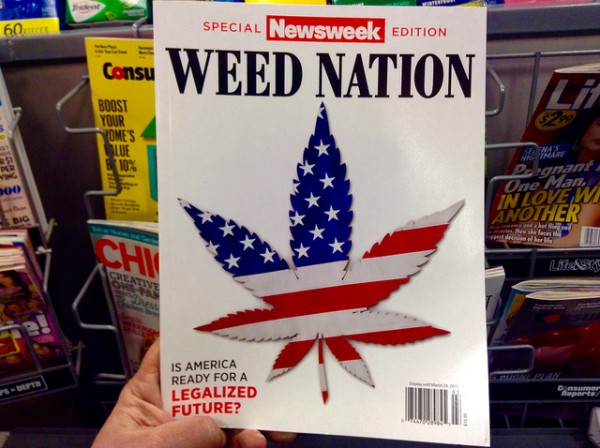
Originally posted on April 25, 2016.
Don Stevens is the mayor of North Bonneville, Washington, a town of about 1,000 people on the banks of the Columbia River near the Oregon border. Using authority granted by a state statute, Stevens established a retail marijuana outlet owned and operated by the town. He wears a shirt that says “Reefer Madness is not a documentary,” and his business cards list his job title as “The Marijuana Mayor.” Stevens thinks North Bonneville’s outlet is the only one of its kind in the country, but that is likely to be only temporarily true. North Bonneville’s initiative is part of a broader movement to legalize marijuana, regulate its distribution, and reap benefits for governments.
The Spread of Marijuana Legalization
As of January 2016, the states of Colorado, Washington, Oregon, and Alaska had authorized the sale and consumption of social marijuana. Twenty-three other states permitted use of marijuana for medical purposes. Governments benefit, not just by reducing crime but also from new revenues. According to the Washington Post, Colorado expected revenues of over a billion dollars in 2016. The realities of economic competition suggest that legal marijuana eventually will become as commonplace as alcohol.
Legalization also makes sense as good public policy. In his 2016 state of the state speech, Vermont Governor Peter Shumlin proposed to allow the sale and possession of small amounts of marijuana. He acknowledged that drug addiction was a threat to Vermont’s social fabric and blamed pharmaceuticals such as OxyContin “which lit the match that ignited America’s opiate and heroin addiction crisis.” But Shumlin argued that marijuana falls into a different category and “should be authorized and regulated by the state.” He asked lawmakers to cooperate with him to develop legislation “that thoughtfully and carefully eliminates the era of prohibition that is currently failing us so miserably.”
Outright prohibition fails because demand for marijuana distorts the economics of legal production. A January 2016 report from the Associated Press described the exportation of marijuana from Colorado to other states, noting the various creative methods used in this distribution, such as “the one in which authorities say 32 people used skydiving planes and posed as licensed medical marijuana caregivers and small business owners to export tens of thousands of pounds of pot grown in Denver warehouses, usually to Minnesota.” This operation made more than $12 million in four years according to criminal indictment, because profits follow the trail of illegality. As Governor Shumlin argues, legalization will reduce the economic incentives for marijuana smuggling.Creating a Public Development Authority for Retail Marijuana
Beyond simple legalization, allowing local governments to control the sale and distribution of marijuana results in better regulation, as the North Bonneville case introduced at the start of this brief illustrates. Under Washington state statues, public entities have power to establish public development authorities for “any lawful public purpose or public function.” The establishing ordinance must limit liability to the assets of the entity in order to protect the city, town, or county from further legal obligation. As one expert in Washington law noted, these authorities “are often created to manage the development and operation of a single project, which the city or county determines is best managed outside of its traditional bureaucracy and lines of authority.”
North Bonnneville’s deliberations began in November 2013 when the town council initiated a public dialogue about the idea of using a public development authority to maintain control over the sale of marijuana. Following a state referendum to legalize marijuana sales, only two retail licenses were allocated to Skamania County, and the council believed that North Bonneville was the best site for an outlet. For the town, it was not just about revenue. The town also hoped to realize additional goals specified in the state referendum, including “ensuring public safety, preventing illegal sales and diversion to minors and funding substance-abuse prevention, research, education, health care and law enforcement service.”Reduced tax burdens are another benefit of this municipal operation. It pays the state excise tax on cannabis, but the store is exempt from federal taxes. Private operators, in contrast, are subject to Internal Revenue Service rules that disallow deductions because they are selling a drug that remains federally prohibited under the Controlled Substances Act. Indeed, although the U.S. federal government is currently not enforcing a full prohibition, marijuana’s illegal classification in the federal statute makes investment in the cannabis industry a risky bet for private business.

Governments and Institutions are Adjusting to New Realities
As marijuana legalization spreads, pressures are growing for municipalities to tap drug revenues. The town of Hayden in western Colorado held a special 2016 elections in which its 1,800 citizens were asked, in a single ballot question, whether the town should “permit, regulate and license the cultivation of retail and medical marijuana under limited circumstances as approved by the Town Council in Ordinance 666?” The measure passed 260 to 236, and town officials will use new tax dollars to stave off a town fiscal crisis. Like North Bonneville and Hayden, more communities are sure to adjust to this new fiscal opportunity.
Even America’s iconic National Football League is bound to adjust its draconian and unrealistic marijuana rules. Running back Ricky Williams told Bleacher Report that cannabis provides more relief from injuries than treatments offered in the locker room. And former Broncos wide receiver Nate Howard told Real Sports that at least 60 percent of players use marijuana for pain management. League penalties are clearly out of touch with reality, when they punish marijuana use more than the abuse of legal prescription drugs that are often more dangerous.
Across the United States marijuana is inexorably marching into the social mainstream. Leaders in government and major institutions will soon learn to get out of the way and take advantage of the new revenues and social benefits that legalization brings. If leaders in the federal government and major parties lag behind, this transformation will happen anyway – one state and one little town at a time.
 Research to Improve Policy: The Scholars Strategy Network seeks to improve public policy and strengthen democracy by organizing scholars working in America's colleges and universities. SSN's founding director is Theda Skocpol, Victor S. Thomas Professor of Government and Sociology at Harvard University.
Research to Improve Policy: The Scholars Strategy Network seeks to improve public policy and strengthen democracy by organizing scholars working in America's colleges and universities. SSN's founding director is Theda Skocpol, Victor S. Thomas Professor of Government and Sociology at Harvard University.